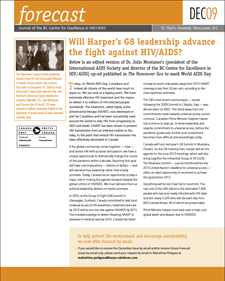Will Harper’s G8 leadership advance the fight against HIV/AIDS?
Today, on World AIDS Day, Canadians and indeed all citizens of the world have much to aspire to. We are now at a tipping point. We have extremely effective HIV treatment and the means to deliver it to millions of HIV-infected people worldwide. The treatment, called highly active antiretroviral therapy (HAART), was developed in part by Canadians and has been successfully used around the world to stop HIV from progressing to AIDS and death. HAART has been shown to prevent HIV transmission from an infected mother to the baby, to the point that vertical HIV transmission has been effectively eliminated in Canada.
If the global community comes together — now — and tackles HIV with purpose and passion, we have a unique opportunity to dramatically change the course of the pandemic within a decade. Reaching that goal will have cost implications — billions of dollars — and will demand true leadership rather than empty promises. Today, Canada has an opportunity to play a major role in moving the agenda forward towards the global control of HIV/AIDS. We must demand that our political leadership delivers on earlier promises.
In 2005, at the Group of Eight (G8) Summit in Gleneagles, Scotland, Canada committed to help fund universal access to HIV prevention, treatment and care by 2010 and to turn the tide against HIV/AIDS by 2015. This included a pledge to deliver lifesaving HAART to everyone in medical need by 2010. Canada has failed to keep its word: only weeks away from 2010 HAART coverage is less than 50 per cent, according to the most optimistic estimates.
The G8’s most recent communiqué — issued following the 2009 Summit in L’Aquila, Italy — was almost silent on AIDS. This trend away from the commitments made towards universal access cannot continue. Canadian Prime Minister Stephen Harper has a chance to step up, to show leadership and reignite commitment to universal access, before the pandemic grows even further and containment becomes more difficult and exceedingly costly.
Canada will host next year’s G8 Summit in Muskoka, Ontario. As the G8 meeting host, Harper will set the agenda for the June 2010 meetings, which will also bring together the influential Group of 20 (G20). The Muskoka Summit — just six months before the 2010 United Nation’s deadline for universal access — offers an ideal opportunity to recommit to achieve this goal before 2015.
Everything will be lost if we fail to recommit. The real cost of the G8’s failure is the estimated 7,400 people who become newly infected with HIV daily and the nearly 5,500 who will die each day from AIDS-related illness. All of which are preventable.
Prime Minister Harper must lead now to help curb global death and despair due to HIV/AIDS.

